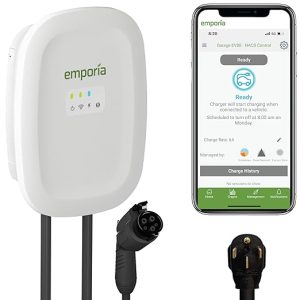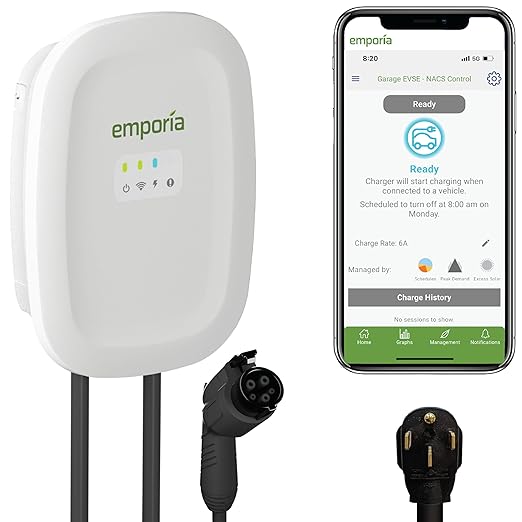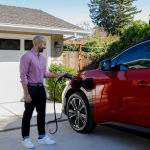The rise of electric vehicles (EVs) is transforming transportation, and a home charging station is a critical component for keeping your EV powered efficiently. Whether for the convenience of overnight charging or to save costs with off-peak rates, a high-quality home charger enhances the EV ownership experience. This article highlights the best home EV charging stations for 2025, analyzing their features, pros and cons, and offering buying and installation advice to help you find the perfect charging solution.

Understanding Home EV Charging
Charging Levels
Home EV charging primarily falls into two categories:
-
Level 1 Charging: Uses a standard 120V household outlet, delivering 1.4-1.9kW, providing about 2-5 miles of range per hour. Fully charging a typical EV (40-80kWh battery) can take 40-50 hours, making it suitable for plug-in hybrids or emergency top-ups.
-
Level 2 Charging: Uses a 240V power source, delivering 3.8-12kW, providing 10-60 miles of range per hour. Level 2 chargers typically charge a battery from 0% to 80% in 4-10 hours, making them the preferred choice for home use.
This article focuses on Level 2 chargers, as they offer the best balance of speed and convenience for most EV owners.
Charging Time Estimates
Charging time depends on the charger’s power, vehicle battery capacity, and charging curve. Below are estimated times for a 40kWh battery (0-80%):
|
Charger Power |
Charging Time (0-80%) |
|---|---|
|
7.7kW |
~4-5 hours |
|
9.6kW |
~3.5-4 hours |
|
11.5kW |
~3-3.5 hours |
Actual times may vary due to ambient temperature, battery condition, and vehicle charging limits.
Key Factors in Choosing a Home Charging Station
When selecting a home EV charging station, consider these critical factors:
-
Amperage and Charging Speed
The charger’s amperage (amps, A) determines charging speed. Common Level 2 chargers range from 16A to 50A. Opt for at least 40A to ensure fast charging. Ensure your home’s electrical system supports the required amperage. -
Cable Length
Cables typically range from 18-25 feet, ensuring coverage from the charger to the vehicle’s charging port. Longer cables offer greater flexibility, especially for garage or outdoor setups. -
Smart Features
Wi-Fi connectivity, mobile apps, and scheduling features optimize charging times and reduce costs. Many chargers allow scheduling for off-peak rates, and some integrate with Alexa or Google Assistant. -
Durability and Weatherproofing
For outdoor installations, choose chargers with high waterproof ratings (e.g., IP66 or IP67) to withstand rain, snow, and extreme weather. Indoor setups can use lower ratings (e.g., NEMA 3R). -
Installation Type
-
Hardwired: Directly connected to the home’s electrical system for maximum stability, ideal for long-term use.
-
Plug-in: Uses a NEMA 14-50 or 6-50 outlet, offering flexibility for relocation but requiring a high-quality outlet (e.g., Hubbell industrial-grade).
-
-
Compatibility
Most EVs use the J1772 connector, while Tesla vehicles use the NACS connector. Some chargers (e.g., Tesla Universal Wall Connector) support both or use adapters, ensuring compatibility with your vehicle. -
Warranty and Support
Choose brands offering 2-5 year warranties and reliable customer support. Established brands like ChargePoint and Tesla typically provide robust service.
Best Home EV Charging Stations for 2025
Based on expert reviews, user feedback, and market performance, here are the top home EV charging stations for 2025:
1. ChargePoint Home Flex
-
Overview: The ChargePoint Home Flex leads the market with its smart features and reliability, ideal for tech-savvy owners.
-
Key Specifications:
-
Amperage: 16-50A (adjustable)
-
Cable Length: 23 feet
-
Connectivity: Wi-Fi, ChargePoint app, supports Alexa and Google Assistant
-
Weatherproofing: NEMA 3R (suitable for outdoor use)
-
Installation: Hardwired or NEMA 14-50 plug
-
-
Pros:
-
Flexible amperage settings for various electrical systems.
-
Excellent app for scheduling, remote monitoring, and energy tracking.
-
Strong brand reputation with a widespread public charging network.
-
-
Cons:
-
Higher price (~$699).
-
Requires hardwiring for maximum output.
-
-
User Feedback: Car and Driver praises its “intuitive app and low maintenance,” ideal for smart home users.
2. JSOWELL Level 2 EV Charger
-
Overview: JSOWELL offers excellent value with robust performance and smart features, perfect for budget-conscious owners.
-
Key Specifications:
-
Amperage: 6-48A
-
Cable Length: 24 feet
-
Connectivity: Wi-Fi, JSOWELL app
-
Weatherproofing: IP66
-
Installation: Hardwired or NEMA 14-50 plug
-
-
Pros:
-
Affordable price (~$399).
-
High amperage output for fast charging.
-
Supports energy management to optimize costs.
-
-
Cons:
-
App interface can feel complex.
-
Less brand recognition than ChargePoint.
-
-
User Feedback: InsideEVs gives it a 99/100 score, calling it “high-quality and economical,” a favorite among users.
3. Tesla Universal Wall Connector
-
Overview: Designed for Tesla but compatible with other EVs via adapters, ideal for Tesla owners and those seeking future-proofing.
-
Key Specifications:
-
Amperage: 12-48A
-
Cable Length: 24 feet
-
Connectivity: Wi-Fi, Tesla app
-
Weatherproofing: NEMA 3R
-
Installation: Hardwired
-
-
Pros:
-
Supports J1772 and NACS connectors for broad compatibility.
-
Seamless integration with Tesla’s ecosystem, including bidirectional charging.
-
Sleek design and easy installation.
-
-
Cons:
-
Limited cost-tracking features.
-
Non-Tesla owners need an adapter (~$100).
-
-
User Feedback: ZDNet recommends it as the top choice for Tesla owners, with users calling it “exceptional and worth the investment.”
4. Grizzl-E Classic
-
Overview: The Grizzl-E Classic is known for durability and simplicity, ideal for extreme climates and budget-conscious users.
-
Key Specifications:
-
Amperage: 40A
-
Cable Length: 25 feet
-
Connectivity: None (base model)
-
Weatherproofing: IP67
-
Installation: Hardwired, NEMA 14-50 or 6-50 plug
-
-
Pros:
-
Aluminum housing for superior durability.
-
Built for harsh weather, made in Canada.
-
Affordable (~$350).
-
-
Cons:
-
No smart features, requiring manual operation.
-
Thicker cable can be less convenient to store.
-
-
User Feedback: Wirecutter names it the best budget option, with users calling it “simple and reliable.”
5. Wallbox Pulsar Plus
-
Overview: The Wallbox Pulsar Plus attracts users with its compact design and smart features, ideal for space-constrained homes.
-
Key Specifications:
-
Amperage: 48A
-
Cable Length: 25 feet
-
Connectivity: Wi-Fi, Wallbox app, supports multi-unit power sharing
-
Weatherproofing: NEMA 4
-
Installation: Hardwired or NEMA 14-50 plug
-
-
Pros:
-
Compact size for flexible installation.
-
Supports multi-unit power sharing for multi-EV households.
-
User-friendly app interface.
-
-
Cons:
-
Higher price (~$699).
-
Slightly less brand recognition.
-
-
User Feedback: InsideEVs praises its “powerful features and elegant design,” ideal for smart users.
6. Autel MaxiCharger Lite 50
-
Overview: The Autel MaxiCharger offers a high 50A output, perfect for users needing fast charging.
-
Key Specifications:
-
Amperage: 50A
-
Cable Length: 25 feet
-
Connectivity: Wi-Fi, Autel app
-
Weatherproofing: IP65
-
Installation: Hardwired or NEMA 14-50 plug
-
-
Pros:
-
Highest amperage output for rapid charging.
-
Comprehensive app with remote control.
-
Offers integrated or detachable holster options.
-
-
Cons:
-
May be overpowered for some users.
-
Mid-range price (~$569).
-
-
User Feedback: Users on InsideEVs call it “high-performing, ideal for high-demand users.”
7. EVIQO EVPOWER 48
-
Overview: EVIQO, an emerging brand, gains traction with high performance and low cost.
-
Key Specifications:
-
Amperage: 48A
-
Cable Length: 25 feet
-
Connectivity: Wi-Fi, EVIQO app
-
Weatherproofing: IP67
-
Installation: Hardwired or NEMA 14-50 plug
-
-
Pros:
-
Affordable (~$399).
-
Three-year warranty (extendable with review).
-
Full smart features.
-
-
Cons:
-
Lower brand recognition, long-term reliability unproven.
-
-
User Feedback: ZDNet calls it “user-friendly and durable,” a top budget-friendly smart charger.
Installation and Cost Considerations
Professional Installation
Level 2 charger installation typically requires a licensed electrician to ensure safety and compliance with local codes. The process includes:
-
Assessing the home’s electrical system to determine if a panel or transformer upgrade is needed.
-
Installing a 240V dedicated circuit supporting 40A or 50A.
-
Connecting and testing the charger.
Costs
-
Charger Price: $350-$800, depending on brand and features.
-
Installation Cost: $550-$1,400, varying by electrical complexity and region.
-
Additional Costs: May include permit fees ($50-$200) or electrical upgrades.
Incentives
The U.S. federal government offers a 30% tax credit for charger and installation costs, up to $1,000, valid through 2032. Some states and utilities provide additional rebates. Check local policies, such as those outlined by Car and Driver.
Installation Location
-
Placement: Install the charger near the parking area, ensuring the cable reaches the vehicle’s charging port.
-
Environmental Considerations: Choose a well-ventilated, shaded location. Outdoor setups require weatherproof chargers.
User Experiences and Feedback
Based on user feedback from forums and review sites, here are common sentiments:
-
ChargePoint Home Flex: Users praise its “intuitive and powerful” smart features, ideal for off-peak charging.
-
JSOWELL Level 2: Popular for affordability and reliability, though some want a simpler app.
-
Tesla Universal Wall Connector: Tesla owners love its “seamless integration,” while non-Tesla users note adapter needs.
-
Grizzl-E Classic: Praised for “rugged durability,” but lack of smart features is a drawback.
-
Wallbox Pulsar Plus: Loved for compact design and power sharing, ideal for multi-EV homes.
-
Autel MaxiCharger: Users note “fast charging speeds,” though it may be overkill for some.
-
EVIQO EVPOWER: Users appreciate its value, but long-term durability is yet to be proven.
Additional Considerations
-
Cost Optimization: Smart chargers’ scheduling features can lower costs by charging during off-peak rates, such as 7 cents/kWh in some regions.
-
Future-Proofing: A 50A charger prepares for future EVs with higher power demands.
-
Renter Rights: Some states have “right-to-charge” laws allowing tenants to install chargers in multi-unit dwellings. See PlugInSites for details.
Conclusion
Choosing the best home EV charging station depends on your budget, feature needs, and vehicle type. Here are tailored recommendations:
-
Smart Feature Enthusiasts: ChargePoint Home Flex offers top-tier app experience and flexibility.
-
Budget-Conscious Owners: JSOWELL Level 2 and EVIQO EVPOWER 48 deliver high performance at low cost.
-
Tesla Owners: Tesla Universal Wall Connector is the go-to for seamless integration.
-
Extreme Climates: Grizzl-E Classic excels in durability.
-
Multi-EV Households: Wallbox Pulsar Plus supports power sharing for multiple EVs.
Ensure your charger supports at least 40A and is installed by a professional electrician for safety. A well-chosen home charging station makes EV charging efficient and convenient, powering every journey with ease.
Frequently Asked Questions
-
What’s the difference between Level 1 and Level 2 chargers?
Level 1 uses 120V outlets, charging slowly (40-50 hours to full); Level 2 uses 240V, charging quickly (4-10 hours). -
Do I need a smart charger?
Smart chargers offer scheduling and monitoring for convenience but aren’t essential; basic models like Grizzl-E Classic suffice. -
Can I install a charger myself?
Plug-in chargers can be self-installed, but hardwired models require a professional electrician for safety and compliance. -
What’s the typical cost of installing a home charger?
Charger prices range from $350-$800, with installation costs of $550-$1,400, depending on electrical setup. -
Are there incentives for installing a charger?
A federal tax credit offers up to $1,000, and some states provide additional rebates. Check local policies.


